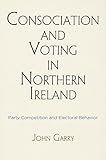Consociation and Voting in Northern Ireland : Party Competition and Electoral Behavior / John Garry.
Material type: TextSeries: National and Ethnic Conflict in the 21st CenturyPublisher: Philadelphia : University of Pennsylvania Press, [2016]Copyright date: ©2017Description: 1 online resource (184 p.) : 76 illusContent type:
TextSeries: National and Ethnic Conflict in the 21st CenturyPublisher: Philadelphia : University of Pennsylvania Press, [2016]Copyright date: ©2017Description: 1 online resource (184 p.) : 76 illusContent type: - 9780812248371
- 9780812293135
- Group identity -- Political aspects -- Northern Ireland -- 21st century
- Northern Irish -- Political activity -- 21st century
- Political parties -- Northern Ireland -- 21st century
- Voting -- Northern Ireland -- Psychological aspects -- 21st century
- Human Rights
- Law
- Political Science
- Public Policy
- POLITICAL SCIENCE / Political Process / Campaigns & Elections
- 324.9416 23
- JN1572.A95 G37 2016eb
- online - DeGruyter
- Issued also in print.
| Item type | Current library | Call number | URL | Status | Notes | Barcode | |
|---|---|---|---|---|---|---|---|
 eBook
eBook
|
Biblioteca "Angelicum" Pont. Univ. S.Tommaso d'Aquino Nuvola online | online - DeGruyter (Browse shelf(Opens below)) | Online access | Not for loan (Accesso limitato) | Accesso per gli utenti autorizzati / Access for authorized users | (dgr)9780812293135 |
Frontmatter -- Contents -- Chapter 1. Consociation and Voting: Ideology, Performance, and Participation -- Chapter 2. Ideology and Vote Choice -- Chapter 3. Ideology and Potential Support for British and Irish Parties -- Chapter 4. Electoral Accountability and Performance- Based Voting -- Chapter 5. Performance and Potentially Voting Across the Divide -- Chapter 6. Understanding Nonparticipation -- Chapter 7. Conclusions -- Appendix: Data -- Notes -- Bibliography -- Index -- Acknowledgments
restricted access online access with authorization star
http://purl.org/coar/access_right/c_16ec
For thirty years, Northern Ireland was riven by sustained ethnonationalist conflict over the issue of whether the territory should remain part of the United Kingdom or reunify with the Republic of Ireland. The 1998 Belfast or "Good Friday" Agreement brought peace to the region by instituting a consociational government, which acknowledged the political differences between nationalists and unionists in Northern Ireland and established a legislative body characterized by power-sharing between the region's political parties. In Consociation and Voting in Northern Ireland, the first study to address electoral behaviors and opinions in a power-sharing society, John Garry interrogates the democratic efficacy of Northern Ireland's consociational government.John Garry investigates the electoral period between 2007-when all of Northern Ireland's major political parties joined the power-sharing government-and 2011 and analyzes postelection survey data to assess the democratic behavior of Northern Irish voters. The evidence is used to address the following questions: How democratic is a consociational government? If all the main parties are in the government, and there are no opposition parties per se, is it possible for voters to hold the government to account? Do power-sharing structures simply perpetuate underlying divisions in the constituency? And since consociational power sharing relies on agreements between senior politicians, can citizens end up feeling disillusioned and, therefore, disinclined to vote? In the process of answering these questions, Garry presents new information on shifting identity formations in Northern Ireland and extends his analysis to the implications of power-sharing agreements for other nations.
Issued also in print.
Mode of access: Internet via World Wide Web.
In English.
Description based on online resource; title from PDF title page (publisher's Web site, viewed 23. Jul 2020)


